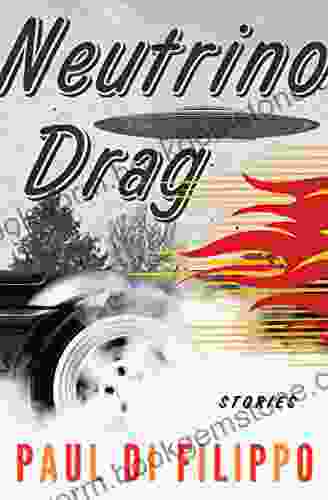The Philosophy of David Lynch: A Philosophical Exploration of Popular Culture

David Lynch is one of the most acclaimed and enigmatic filmmakers of our time. His work is a rich tapestry of philosophical themes, exploring the nature of reality, the unconscious mind, and the human condition. Lynch's films and television series have been praised for their originality, their surreal imagery, and their psychological depth.
5 out of 5
| Language | : | English |
| File size | : | 513 KB |
| Text-to-Speech | : | Enabled |
| Screen Reader | : | Supported |
| Enhanced typesetting | : | Enabled |
| Word Wise | : | Enabled |
| Print length | : | 247 pages |
This article will delve into Lynch's unique philosophy, examining his major films and television series to uncover the profound insights they offer into our understanding of the world and ourselves. We will explore Lynch's ideas about reality, the unconscious mind, the nature of evil, and the human search for meaning.
The Nature of Reality
One of the central themes in Lynch's work is the nature of reality. Lynch's films often depict a world that is strange and unsettling, a world where the boundaries between reality and illusion are blurred. In Eraserhead (1977),for example, the protagonist lives in a nightmarish, industrial landscape where the laws of physics seem to be suspended. In Twin Peaks (1990-1991, 2017),the town of Twin Peaks is a place where the supernatural and the mundane coexist.
Lynch's work suggests that reality is not a fixed and objective entity, but rather a subjective experience that is shaped by our own perceptions and beliefs. In Mulholland Drive (2001),for example, the protagonist's reality is constantly shifting, as she moves between the dream world and the real world. This suggests that reality is not something that is given to us, but rather something that we create for ourselves.
The Unconscious Mind
Another important theme in Lynch's work is the unconscious mind. Lynch's films and television series often explore the dark recesses of the human psyche, revealing the hidden fears, desires, and traumas that we all carry within us. In Blue Velvet (1986),for example, the protagonist discovers a dark and sinister world beneath the surface of his small town. In Lost Highway (1997),the protagonist is haunted by a doppelganger who represents his own repressed desires.
Lynch's work suggests that the unconscious mind is a powerful force that can shape our lives in both positive and negative ways. It can be a source of creativity and inspiration, but it can also be a source of darkness and destruction. It is important to understand the unconscious mind and to learn how to harness its power in a positive way.
The Nature of Evil
Evil is a recurring theme in Lynch's work. His films and television series often depict characters who are driven by evil impulses. In Eraserhead, for example, the protagonist is haunted by a monstrous baby that represents his own repressed rage. In Twin Peaks, the town is plagued by a serial killer who represents the darkness that lurks within us all.
Lynch's work suggests that evil is not something that is external to us, but rather something that is within us all. It is a part of our nature, and it is something that we must constantly struggle against. It is important to understand the nature of evil and to learn how to resist its temptations.
The Human Search for Meaning
In addition to his exploration of reality, the unconscious mind, and evil, Lynch's work also deals with the human search for meaning. His films and television series often depict characters who are searching for meaning in their lives. In The Elephant Man (1980),for example, the protagonist is a deformed man who struggles to find acceptance in society. In Wild at Heart (1990),the protagonists are a young couple who embark on a road trip in search of their true selves.
Lynch's work suggests that the search for meaning is a lifelong journey. It is not something that can be easily achieved, but it is something that we must all strive for. It is important to find meaning in our lives, because it is what gives us purpose and direction.
David Lynch is one of the most important and influential filmmakers of our time. His work is a rich tapestry of philosophical themes, exploring the nature of reality, the unconscious mind, the nature of evil, and the human search for meaning. Lynch's films and television series offer us profound insights into our understanding of the world and ourselves. They are works of art that are both challenging and rewarding, and they continue to inspire and provoke us to this day.
5 out of 5
| Language | : | English |
| File size | : | 513 KB |
| Text-to-Speech | : | Enabled |
| Screen Reader | : | Supported |
| Enhanced typesetting | : | Enabled |
| Word Wise | : | Enabled |
| Print length | : | 247 pages |
Do you want to contribute by writing guest posts on this blog?
Please contact us and send us a resume of previous articles that you have written.
 Best Book
Best Book Page Flip
Page Flip Bookshelf
Bookshelf Literary loom
Literary loom Chapter
Chapter Bookish
Bookish PageTurner
PageTurner Bibliophile
Bibliophile Story
Story Inkwell
Inkwell Bookworm
Bookworm Labyrinth
Labyrinth Plot Twist
Plot Twist Prose
Prose Paperback
Paperback Storyteller
Storyteller Sanctuary
Sanctuary Fiction
Fiction Reading
Reading Chronicle
Chronicle Read
Read Sasha Chapin
Sasha Chapin Darren Arnold
Darren Arnold Pam Flowers
Pam Flowers Nicole Kornher Stace
Nicole Kornher Stace Denise Bossarte
Denise Bossarte Darren Mooney
Darren Mooney Regina Kanyu Wang
Regina Kanyu Wang Robert Appel
Robert Appel Daniella Dechristopher
Daniella Dechristopher Gavin Larsen
Gavin Larsen Margot Mifflin
Margot Mifflin Lester Meachem
Lester Meachem David Horgan
David Horgan Naima Simone
Naima Simone David Kerr
David Kerr Karen Traviss
Karen Traviss Marilyn Monroe
Marilyn Monroe Lara Dawson
Lara Dawson Wes Singletary
Wes Singletary Ruth Leaf
Ruth Leaf Stuart Macdonald
Stuart Macdonald Stanley Lane Poole
Stanley Lane Poole David Canford
David Canford Judy Batalion
Judy Batalion Mark Mazower
Mark Mazower Quanna Lashae
Quanna Lashae Keith Laumer
Keith Laumer Davey Johnson
Davey Johnson David Thomas
David Thomas Keitra Crooks
Keitra Crooks Diane Chamberlain
Diane Chamberlain Fx Holden
Fx Holden Liron Yanconsky
Liron Yanconsky Daniel Zaragoza
Daniel Zaragoza Sarfraz Manzoor
Sarfraz Manzoor Mike Farris
Mike Farris Dr Lew Deitch
Dr Lew Deitch Troy Anthony Platt
Troy Anthony Platt Stephen Arseneault
Stephen Arseneault Dawn C Crouch
Dawn C Crouch Thomas Booth
Thomas Booth Lynn Vincent
Lynn Vincent Gail Anderson
Gail Anderson Peter Ackroyd
Peter Ackroyd Erin Morgenstern
Erin Morgenstern David Weber
David Weber Debrah Martin
Debrah Martin Martin Turner
Martin Turner Bob Martin
Bob Martin Eric Thomson
Eric Thomson Peter Lovatt
Peter Lovatt Richard Wagamese
Richard Wagamese Delphi Classics
Delphi Classics Spider Robinson
Spider Robinson Jemma Westbrook
Jemma Westbrook Gretel Ehrlich
Gretel Ehrlich Paul Talbot Greaves
Paul Talbot Greaves David Menconi
David Menconi Margaret Ranger
Margaret Ranger David Deutschmann
David Deutschmann David James
David James Danyel Smith
Danyel Smith David Hopkins
David Hopkins Denise Kahn
Denise Kahn Tory Bilski
Tory Bilski Karen Kaufman Wilson
Karen Kaufman Wilson Mary Jane Jacob
Mary Jane Jacob Raven Rivers
Raven Rivers Judith Kerr
Judith Kerr Jeffrey Tayler
Jeffrey Tayler Gulwali Passarlay
Gulwali Passarlay Laquette
Laquette Fredric Jameson
Fredric Jameson Jack Vance
Jack Vance Lauren Markham
Lauren Markham Daniel Bellon
Daniel Bellon David Leite
David Leite Danika Stone
Danika Stone Karena Dawn
Karena Dawn Robert Sitton
Robert Sitton Ken Britz
Ken Britz Jim Richards
Jim Richards Peggy Guggenheim
Peggy Guggenheim Katrien Van Der Schueren
Katrien Van Der Schueren David Coggins
David Coggins David Shimwell
David Shimwell Deborah Tannen
Deborah Tannen Jo Toye
Jo Toye Darwyn Cooke
Darwyn Cooke Robbie Robertson
Robbie Robertson Russ Roberts
Russ Roberts Gregory Allanther
Gregory Allanther Tulku Urgyen Rinpoche
Tulku Urgyen Rinpoche David Leddick
David Leddick Michael Robertson
Michael Robertson Glenn Kardy
Glenn Kardy Gloria Anzaldua
Gloria Anzaldua George L Wybenga
George L Wybenga Stanley Vestal
Stanley Vestal Laxuri Art
Laxuri Art Heather Alexander
Heather Alexander Ludovic Castro
Ludovic Castro Pen Quiller
Pen Quiller Dorothy Dent
Dorothy Dent Victor Zugg
Victor Zugg Wanda Compres
Wanda Compres Lynnea Lee
Lynnea Lee David Hagberg
David Hagberg Kirill Klevanski
Kirill Klevanski Fang Fang
Fang Fang Lillian Colon
Lillian Colon Pete Hamill
Pete Hamill Graham Hutchins
Graham Hutchins Larry Miller
Larry Miller Sarah Waters
Sarah Waters Jessica Swale
Jessica Swale David Mack
David Mack Nathan Hystad
Nathan Hystad Jim Krause
Jim Krause Danny Peary
Danny Peary Darren Craig
Darren Craig Kembrew Mcleod
Kembrew Mcleod Joy Spanabel Emery
Joy Spanabel Emery Mia Mckenzie
Mia Mckenzie Diane Alber
Diane Alber Nathan Johnson
Nathan Johnson David Langlieb
David Langlieb Jason Thomas
Jason Thomas Sue Roe
Sue Roe Daniel Gross
Daniel Gross Yossi Klein Halevi
Yossi Klein Halevi Franziska Thomas
Franziska Thomas Eve Laplante
Eve Laplante Paul Schrader
Paul Schrader Jack Hartnell
Jack Hartnell Jim Harter
Jim Harter Matt Brown
Matt Brown Tracy Clark
Tracy Clark Pete Wilton
Pete Wilton Ann Cleeves
Ann Cleeves Sister Souljah
Sister Souljah R P Jones
R P Jones Donna Everhart
Donna Everhart Jodi Bombardier
Jodi Bombardier David Koenig
David Koenig Dawnn Karen
Dawnn Karen Dean Koontz
Dean Koontz Jahquel J
Jahquel J Ira Block
Ira Block M H Johnson
M H Johnson David Hughes
David Hughes Darktechnomancer
Darktechnomancer Patrice Fitzgerald
Patrice Fitzgerald Moritz Fink
Moritz Fink Reni K Amayo
Reni K Amayo Edward W Said
Edward W Said Darrel Rees
Darrel Rees Lara Lee
Lara Lee Christopher Panaretos
Christopher Panaretos Bob Dow
Bob Dow Bill Richardson
Bill Richardson Gilda Williams
Gilda Williams K B Wagers
K B Wagers Jan De Volder
Jan De Volder Edwidge Danticat
Edwidge Danticat Mark Hillary
Mark Hillary Nicole R Fleetwood
Nicole R Fleetwood Wesley Chu
Wesley Chu Jenifer Lewis
Jenifer Lewis John Rae
John Rae G J Ogden
G J Ogden Helen Birch
Helen Birch Debra Bricker Balken
Debra Bricker Balken Henry Evans
Henry Evans William Alan Webb
William Alan Webb Frank Gado
Frank Gado Paul Bonnet
Paul Bonnet Daniel M Bensen
Daniel M Bensen Stefano Mancuso
Stefano Mancuso Natascha Carrel
Natascha Carrel G S Jennsen
G S Jennsen Mary Stewart
Mary Stewart David Downie
David Downie Leonard S Marcus
Leonard S Marcus Henry K Miller
Henry K Miller David Aston
David Aston Mark Willenbrink
Mark Willenbrink Dave Watson
Dave Watson Martha R Severens
Martha R Severens Steven Watts
Steven Watts Reese Ryan
Reese Ryan Tanisha Stewart
Tanisha Stewart David Margolick
David Margolick James Naremore
James Naremore Silas Munro
Silas Munro Vivian Chong
Vivian Chong Tom Clancy
Tom Clancy Eric Knowles
Eric Knowles Enrique Zaldivar
Enrique Zaldivar Tina Dreffin
Tina Dreffin Patty Brown
Patty Brown Lily King
Lily King Peter Millar
Peter Millar Bill Rumpel
Bill Rumpel David Long
David Long P W Jordan
P W Jordan Dean Movshovitz
Dean Movshovitz John Mcmanus
John Mcmanus Drew Pritchard
Drew Pritchard Danny White
Danny White David Conyers
David Conyers Dave White
Dave White Richard Brody
Richard Brody William Morris
William Morris Rafael Ocasio
Rafael Ocasio Steve Russell
Steve Russell West Fraser
West Fraser Danielle Allen
Danielle Allen Wolfgang Ziegler
Wolfgang Ziegler David Hallberg
David Hallberg Tullio Kezich
Tullio Kezich Kim Stanley Robinson
Kim Stanley Robinson Daniel Ritchie
Daniel Ritchie Marisa Handler
Marisa Handler Rachel Mintz
Rachel Mintz Madelynn Dickerson
Madelynn Dickerson Peter Aleshire
Peter Aleshire Juliet Defore
Juliet Defore Dzongsar Jamyang Khyentse
Dzongsar Jamyang Khyentse Ruth Superhal
Ruth Superhal Robert Arp
Robert Arp Norman F Cantor
Norman F Cantor Delayed Gratification
Delayed Gratification Linda J Tomko
Linda J Tomko David Goudsward
David Goudsward David Ritz
David Ritz Joni Eareckson Tada
Joni Eareckson Tada Nancy Uno
Nancy Uno Rachel Howzell Hall
Rachel Howzell Hall David Petrie
David Petrie Klaus Carl
Klaus Carl Melinda Buckwalter
Melinda Buckwalter Stella Blum
Stella Blum Joynell Schultz
Joynell Schultz Denise Essex
Denise Essex Josh Reynolds
Josh Reynolds Rosanna Ley
Rosanna Ley Tim Leong
Tim Leong Keith Mcdonald
Keith Mcdonald Jennifer Julie Miller
Jennifer Julie Miller David Bellamy
David Bellamy Diego Rica
Diego Rica Mitch Weiss
Mitch Weiss Martha Wells
Martha Wells Daniel Hardie
Daniel Hardie Janet Anderson
Janet Anderson Elizabeth Gilpin
Elizabeth Gilpin Morgan Jerkins
Morgan Jerkins David B Levy
David B Levy Jesse Bryant Wilder
Jesse Bryant Wilder J G Heck
J G Heck Lewis F Day
Lewis F Day Dartanya A Williams Sr
Dartanya A Williams Sr Stu Glauberman
Stu Glauberman Kyle West
Kyle West David Murphy
David Murphy S W Erdnase
S W Erdnase Nanchu
Nanchu Iesha Bree
Iesha Bree Lisa Allen Agostini
Lisa Allen Agostini Daniel Suarez
Daniel Suarez Miles J Unger
Miles J Unger Stella Suberman
Stella Suberman Rose Marie Beebe
Rose Marie Beebe Michael J Sullivan
Michael J Sullivan David Sherwin
David Sherwin Bryan Bishop
Bryan Bishop International Learning Academy
International Learning Academy Thorkild Hansen
Thorkild Hansen Daryl Lane
Daryl Lane Gaston Dorren
Gaston Dorren Lisa Congdon
Lisa Congdon Lewis Carroll
Lewis Carroll Darius Hinks
Darius Hinks Donna Tartt
Donna Tartt Mike Puma
Mike Puma Dartagnan
Dartagnan David Mura
David Mura Jamer Hunt
Jamer Hunt Dave Tucker
Dave Tucker H Terrell Griffin
H Terrell Griffin The Expat Homes Team
The Expat Homes Team David Blaine
David Blaine Bob Leszczak
Bob Leszczak Jennifer Dasal
Jennifer Dasal Edmond De Goncourt
Edmond De Goncourt Orson Scott Card
Orson Scott Card Marques Vickers
Marques Vickers Posey Parks
Posey Parks Jean Daive
Jean Daive Marie Rochelle
Marie Rochelle Scotto Moore
Scotto Moore Mako
Mako David Bennun
David Bennun Joseph M Mascia
Joseph M Mascia Marion Mcnealy
Marion Mcnealy David Salle
David Salle Gayne C Young
Gayne C Young Jim Downing
Jim Downing Dervla Murphy
Dervla Murphy Jeffrey Weiss
Jeffrey Weiss Graham Swift
Graham Swift Zoe Ingram
Zoe Ingram Robert Beer
Robert Beer Jeffrey Round
Jeffrey Round Walt Browning
Walt Browning Emilio Estefan
Emilio Estefan Scott Ryan
Scott Ryan Dawn Emerson
Dawn Emerson Ross Buzzell
Ross Buzzell Steve Roberts
Steve Roberts Jeffrey Scott
Jeffrey Scott William J Conaway
William J Conaway Shelley Hitz
Shelley Hitz David Baldacci
David Baldacci Richard Antoine White
Richard Antoine White Don Keith
Don Keith Jonathan Nicholas
Jonathan Nicholas James Lee Burke
James Lee Burke Daniel Pennac
Daniel Pennac David Schwartz
David Schwartz Harry Bernstein
Harry Bernstein Frederick Law Olmsted
Frederick Law Olmsted Roxie Mcclaine
Roxie Mcclaine Robert L Wise
Robert L Wise Vicki Rozema
Vicki Rozema Ray Bradbury
Ray Bradbury Denise J Howard
Denise J Howard Lee J Ames
Lee J Ames Erica A Davis
Erica A Davis Julia Hsieh
Julia Hsieh Danielle Martin
Danielle Martin Shirley Ann Grau
Shirley Ann Grau Dave Rearwin
Dave Rearwin Linda Leaming
Linda Leaming Josh Karp
Josh Karp Ian Fleming
Ian Fleming David Tuffley
David Tuffley George Catlin
George Catlin David Railton
David Railton Liz Marsham
Liz Marsham Niraj Gupta
Niraj Gupta Tom Spector
Tom Spector John Graves
John Graves Mark Arnold
Mark Arnold Thor Hanson
Thor Hanson Lawrence Hill
Lawrence Hill Wassily Kandinsky
Wassily Kandinsky Ryukyu Saito
Ryukyu Saito Ginny Dye
Ginny Dye Misty Copeland
Misty Copeland Ignacio J Esteban
Ignacio J Esteban Daniel Arenson
Daniel Arenson Marcos Enrique Ruiz Rivero Ii Aviel
Marcos Enrique Ruiz Rivero Ii Aviel R Neil Hewison
R Neil Hewison David Lebovitz
David Lebovitz Marra B Gad
Marra B Gad David Ellsworth
David Ellsworth Ivan Margolius
Ivan Margolius Robin Esrock
Robin Esrock Ilona Andrews
Ilona Andrews David Byrne
David Byrne Thomas Nast
Thomas Nast George Morton Jack
George Morton Jack Stephanie Hemelryk Donald
Stephanie Hemelryk Donald Karl F Cohen
Karl F Cohen Simon Callow
Simon Callow Vivienne Cawson
Vivienne Cawson Meghan March
Meghan March Tania Romanov
Tania Romanov Lise Herzog
Lise Herzog Thorstein Veblen
Thorstein Veblen Joseph Abboud
Joseph Abboud Elizabeth M Bonker
Elizabeth M Bonker Kenneth Clark
Kenneth Clark Gary Greene
Gary Greene Robert Rodriguez
Robert Rodriguez Donald Hoffmann
Donald Hoffmann Tj Reynolds
Tj Reynolds Ray Oslow
Ray Oslow Ron Wiggins
Ron Wiggins Daniel Ankele
Daniel Ankele Jody Eddy
Jody Eddy Daniel Silva
Daniel Silva Ryan Hendrickson
Ryan Hendrickson Sarah Jane Cervenak
Sarah Jane Cervenak Jiedson Domigpe
Jiedson Domigpe Laura Rascaroli
Laura Rascaroli Wilson Bickford
Wilson Bickford David Riley
David Riley Kushanava Choudhury
Kushanava Choudhury Simon R Green
Simon R Green Daniel Schinhofen
Daniel Schinhofen Gayatri Gopinath
Gayatri Gopinath David Simpson
David Simpson David Plumbley
David Plumbley Ira Heinichen
Ira Heinichen Jack Reid
Jack Reid Patrick Bixby
Patrick Bixby Susanna Moodie
Susanna Moodie David J Schmidt
David J Schmidt Rosario Marin
Rosario Marin Virginia Matheson Hooker
Virginia Matheson Hooker Sia N Evans
Sia N Evans Kathy Arlyn Sokol
Kathy Arlyn Sokol David Greenberg
David Greenberg Liz Harper
Liz Harper David Tracey
David Tracey Maxine Hong Kingston
Maxine Hong Kingston Loretta Lynn
Loretta Lynn Steve Hulett
Steve Hulett Mark Mccrum
Mark Mccrum Richard Kurin
Richard Kurin Rick Stein
Rick Stein Kimberly Wilkes
Kimberly Wilkes Jayne Castle
Jayne Castle Laura Kasinof
Laura Kasinof Thomas Sowell
Thomas Sowell Carlos Francisco Jackson
Carlos Francisco Jackson Honey Phillips
Honey Phillips Kenneth Brantingham
Kenneth Brantingham Michael Bamberger
Michael Bamberger Thomas Pecore Weso
Thomas Pecore Weso Mary G Houston
Mary G Houston William Feaver
William Feaver James Mcbride
James Mcbride William Henry Jackson
William Henry Jackson Hester Berry
Hester Berry Terry Pratchett
Terry Pratchett Joy Deja King
Joy Deja King Eneasz Brodski
Eneasz Brodski Darryl Anka
Darryl Anka Jim Butcher
Jim Butcher Mimi Matthews
Mimi Matthews University Press
University Press J T R Brown
J T R Brown Edward Butts
Edward Butts David Lundberg
David Lundberg Denise Bosler
Denise Bosler E M Hardy
E M Hardy Maryse Conde
Maryse Conde Jonathan Fenby
Jonathan Fenby Rick Griffin
Rick Griffin Susana Martinez Conde
Susana Martinez Conde Gene Deitch
Gene Deitch Tracey English
Tracey English Iain Rob Wright
Iain Rob Wright Daria Gabryanczyk
Daria Gabryanczyk David Gessner
David Gessner Mark Zupan
Mark Zupan Crystal Allen
Crystal Allen William Least Heat Moon
William Least Heat Moon David Hoffer
David Hoffer Vanda Jackson
Vanda Jackson Warren Berger
Warren Berger Stephanie Pui Mun Law
Stephanie Pui Mun Law Brendan Keogh
Brendan Keogh Deirdre Slattery
Deirdre Slattery Lina Rather
Lina Rather David Roberts
David Roberts Susan Stoker
Susan Stoker Gerald Clark
Gerald Clark Rick Goldschmidt
Rick Goldschmidt Michael Schumacher
Michael Schumacher Dean Dalton
Dean Dalton Nathan Van Coops
Nathan Van Coops Timothy Ellis
Timothy Ellis Dawn G Marsh
Dawn G Marsh Nick Steverson
Nick Steverson Ivan Doig
Ivan Doig James Cook
James Cook Tilar J Mazzeo
Tilar J Mazzeo David Stevens
David Stevens Jung Chang
Jung Chang John Richardson
John Richardson Robert Jordan
Robert Jordan John Samuel Barnett
John Samuel Barnett Jerzy Kosinski
Jerzy Kosinski E B Hudspeth
E B Hudspeth Darren Waldron
Darren Waldron J L Williams
J L Williams Glenn Dixon
Glenn Dixon Veronica Toumanova
Veronica Toumanova Sylvia Plath
Sylvia Plath Deborah Solomon
Deborah Solomon Veronique Blanchard
Veronique Blanchard Janet Mock
Janet Mock Darby Penney
Darby Penney Jonathan Dehart
Jonathan Dehart James Ellroy
James Ellroy Vanessa Miller
Vanessa Miller Robert B Parker
Robert B Parker Roderick Beaton
Roderick Beaton Frank Mccourt
Frank Mccourt Darren Naish
Darren Naish Mary Strong
Mary Strong Lisa M Rose
Lisa M Rose David Britland
David Britland Ian St Martin
Ian St Martin Howard Fast
Howard Fast Stephen Coonts
Stephen Coonts Daniel Pierce
Daniel Pierce Mike Doyle
Mike Doyle Edward Brody
Edward Brody Elizabeth F Heath
Elizabeth F Heath Jocelyn Nicole Johnson
Jocelyn Nicole Johnson David A Badillo
David A Badillo Debby Detering
Debby Detering Lev Grossman
Lev Grossman Thi Bui
Thi Bui David Hornung
David Hornung Greg Dragon
Greg Dragon Dominique Mondesir
Dominique Mondesir K Alex Walker
K Alex Walker David Brin
David Brin David W Cameron
David W Cameron Heidi W Durrow
Heidi W Durrow Steve Erickson
Steve Erickson Thomas Kearney
Thomas Kearney Tim Clissold
Tim Clissold David Beers
David Beers Rich Cohen
Rich Cohen Rob Mendez
Rob Mendez David Codamo
David Codamo E Lucas Bridges
E Lucas Bridges J A Jance
J A Jance Emily Owen
Emily Owen Lisa Smith
Lisa Smith Daniel Okrent
Daniel Okrent Jacqueline Winspear
Jacqueline Winspear Sonia Choquette
Sonia Choquette Patrick Drazen
Patrick Drazen Jerry Boyd
Jerry Boyd Danielle Kroll
Danielle Kroll Deborah Feldman
Deborah Feldman Michal Ramsey Smith
Michal Ramsey Smith Potter Style
Potter Style Tim Hodkinson
Tim Hodkinson V D Bucket
V D Bucket Bill Gardner
Bill Gardner David A Goodman
David A Goodman David F Walker
David F Walker Robbie Sheerin
Robbie Sheerin Robert Barlas
Robert Barlas Rosemary Agonito
Rosemary Agonito William Dalrymple
William Dalrymple Kim Cash Tate
Kim Cash Tate Trip Stevens
Trip Stevens Kitty Pilgrim
Kitty Pilgrim Daniel Black
Daniel Black Ernest Shackleton
Ernest Shackleton Tony White
Tony White Dru Pagliassotti
Dru Pagliassotti Lucy Ryder Richardson
Lucy Ryder Richardson Trisha R Thomas
Trisha R Thomas Gustav Stickley
Gustav Stickley Sue Monk Kidd
Sue Monk Kidd Lolah Lace
Lolah Lace Roy Simmons
Roy Simmons Cornelius C Kubler
Cornelius C Kubler Manohla Dargis
Manohla Dargis Preston Grassmann
Preston Grassmann Rosie Martin
Rosie Martin Lawrence Baldassaro
Lawrence Baldassaro Eric Lomax
Eric Lomax Virginia Melville Cowart
Virginia Melville Cowart Euromentravel Com
Euromentravel Com Janet Kagan
Janet Kagan Daniel Gibbs
Daniel Gibbs Daniel Dae Kim
Daniel Dae Kim
Light bulbAdvertise smarter! Our strategic ad space ensures maximum exposure. Reserve your spot today!

 Ken SimmonsBrother in Ice: The Unbelievable Story of Paul Bonnet, the Man Who Survived...
Ken SimmonsBrother in Ice: The Unbelievable Story of Paul Bonnet, the Man Who Survived...
 Kyle PowellUnveiling the Treasures of the 19th Century: A Pictorial Archive from Dover's...
Kyle PowellUnveiling the Treasures of the 19th Century: A Pictorial Archive from Dover's...
 Jorge Luis BorgesPillars Of Fire Light: Illuminating the Ancient World with Modern Technology
Jorge Luis BorgesPillars Of Fire Light: Illuminating the Ancient World with Modern Technology Gregory WoodsFollow ·6.2k
Gregory WoodsFollow ·6.2k Alvin BellFollow ·14.8k
Alvin BellFollow ·14.8k Nathaniel HawthorneFollow ·16.3k
Nathaniel HawthorneFollow ·16.3k Jean BlairFollow ·13.7k
Jean BlairFollow ·13.7k Eli BrooksFollow ·15.7k
Eli BrooksFollow ·15.7k George Bernard ShawFollow ·6.1k
George Bernard ShawFollow ·6.1k Marcus BellFollow ·14.6k
Marcus BellFollow ·14.6k Garrett PowellFollow ·10.8k
Garrett PowellFollow ·10.8k

 Roland Hayes
Roland HayesWe Were 12 At 12:12 On 12/12/12: Adventure Travel Tales
On December 12, 2012, at...

 Corey Green
Corey GreenUnveiling Adventure and Ecotourism in Edward James'...
Nestled amidst the lush...

 Douglas Foster
Douglas FosterBerkeley Artisan Food Markets: A Culinary Adventure in...
Nestled amidst...

 Dan Henderson
Dan HendersonThanksgiving in 24 Hours: Travel Tales to Inspire Your...
Thanksgiving is a time for family, friends,...

 Reginald Cox
Reginald CoxMusic and Literature Against the Grain: Exploring the...
: The Allure of...
5 out of 5
| Language | : | English |
| File size | : | 513 KB |
| Text-to-Speech | : | Enabled |
| Screen Reader | : | Supported |
| Enhanced typesetting | : | Enabled |
| Word Wise | : | Enabled |
| Print length | : | 247 pages |







